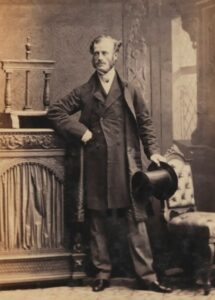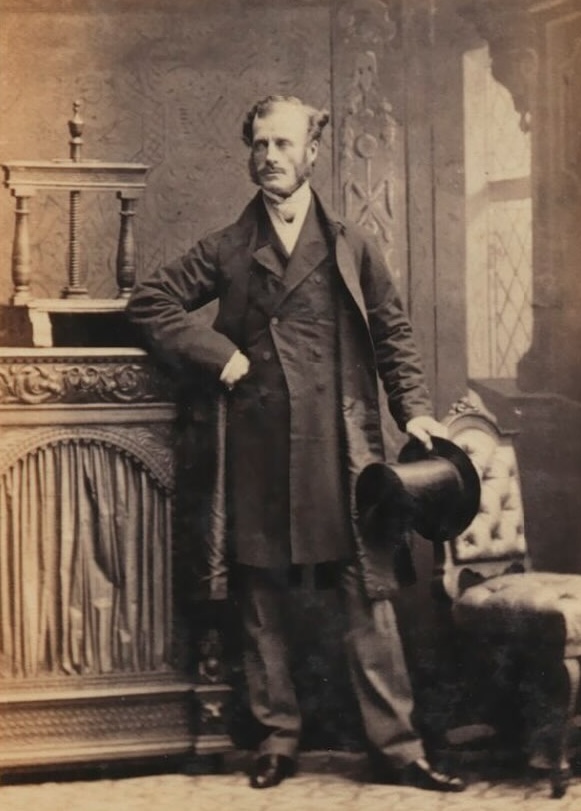
General Sir Edward Charles Warde
Source: National Portrait Gallery
General Sir Edward Charles Warde K.C.B. (13 November 1810 – 10 June 1884) was an India-born British army officer in the Royal Horse Artillery. He fought at the Siege of Sevastopol during the Crimean War, serving as Lieutenant Colonel in command of the Royal Artillery siege train.
After suffering invalidity, and being successfully cured by Frederick Hervey Foster Quin, Edward Charles Warde became a dedicated advocate of homeopathy. He was a contributor to the first London Homeopathic hospital, and ensured his wife and children were all treated homeopathically.
Warde also became a competent veterinary homeopath himself, and he entrusted his military horses to the care of army veterinary surgeon and homeopath, William Haycock.
General Sir Edward Charles Warde was born in 1810. He was the son of Lt. Gen. Sir Henry Warde. He married Jane Lane, daughter of Reverend Charles Lane and Frances Catherine Sandford, on 24 August 1843 at Deal, Kent, England. General Sir Edward Charles Warde fought in the Crimean War, where he commanded the British seige train at Sebastopol. He was decorated with the award of Knight, Order of the Medjidie. He gained the rank of General in the service of the Royal Artillery. He was decorated with the award of Officer, Legion of Honour. He was invested as a Knight Commander, Order of the Bath (K.C.B.).
At a general meeting of the British Homeopathic Association (BHA) in London in August 1849, then Captain Warde R.A. explained why he and his family had embraced homeopathy. He recounted how he had been an invalid for eight years, exhausting all the medications that Allopathy could offer. At the suggestion of the BHA President, the Duke of Beaufort, he became a patient of Frederick Hervey Foster Quin and, over a period of some months, regained his health completely.
Edward Charles Warde subsequently ensured that his wife and children were treated homeopathically. The report of the meeting quoted Warde, who told the attendees that:
He had now four children – the youngest but six months old, and the eldest three years; and never, since the birth of the latter, had they been subject to any treatment but that of Homoeopathy, and he could assure them that, from the eldest to the youngest, more flourishing specimens of Homoeopathic practice were not to be found. (Hear, hear, and loud laughter.)
At the same meeting, Warde also lamented the lack of homeopathic practitioners in Ireland, and recommended the homeopathic community remedy this as soon as possible.
In 1851, Captain Warde of the Royal Horse Artillery consulted William Haycock, a homeopathic veterinary surgeon in Huddersfield, to attend one of his horses which, recovering from influenza, was now suffering from difficulty in breathing. Haycock treated the horse with Arsenicum and Sulphur and the horse recovered. Shortly thereafter, Warde entrusted William Haycock with the complete homeopathic management of all of the horses belonging to C Troop, Royal Horse Artillery, at the Leeds Barracks.
Warde provided Haycock with the following testimonial:
“Dear Sir, I have very great pleasure in complying with your request, and in certifying that you have treated between 70 – 80 horses which were under my charge, on the homeopathic system of medicine, for a period of eighteen months.
“There were some acute and very dangerous cases, others of chronic character, and I have no hesitation in testifying to the perfect and complete success of your treatment under both circumstances.
“I have amply tested this system in my own stables for many years, and am perfectly satisfied of its vast superiority over the old mode of veterinary treatment in every way.
“You are at liberty to make any use you may think proper of this, and, I am, your sincere well wisher. E Warde Captain, Royal Horse Artillery, Woolwich, May 18th 1853.”
In his turn, Haycock complimented Warde on his proficient knowledge of homeopathy:
All who are personally acquainted with Captain Warde, know perfectly well that his practical knowledge of homoeopathy is of a more profound nature than is generally to be met with. He has, and I may say, continues to study the system, from a firm conviction of its vast worth and importance, not only to his fellow creatures, when diseased, but in its applicability to the diseases of the horse as well. He has personally superintended the homoeopathic treatment of great numbers of cases, and he is eminently qualified in every way to speak as to the practical value of the system to our class of patients; and I cannot allow this opportunity to pass without expressing my warm thanks for the courtesy and attention which I uniformly received from this gentleman, during the time I was in attendance upon his troop. The curative effects of the homoeopathic system upon the diseases incidental to the lower animals, is no longer a probability or a question of uncertainty; it is a fact…
In November 1865, Warde, by then a General and Commander of the Woolwich depot, wrote to the Morning Advertiser in support of homeopathy as an effective treatment for an outbreak of rinderpest cattle plague that had devastated cattle herds in Britain and Ireland.
General Sir Edward Charles Warde died at his home, 57 Brunswick Square, Brighton, on 10 June 1884. He was laid to rest in the churchyard of St George‘s, Wrotham, Kent.
Of interest:
Sir Charles Edward Warde, 1st Baronet (20 December 1845 – 12 April 1937), son of General Sir Edward Charles Warde, was a Conservative Party politician in England who served as a Member of Parliament (M.P.) for Medway constituency from 1892 to 1918.



Leave A Comment